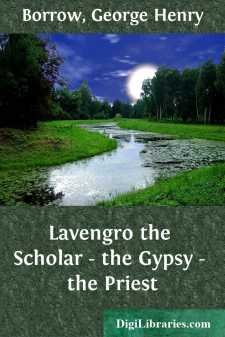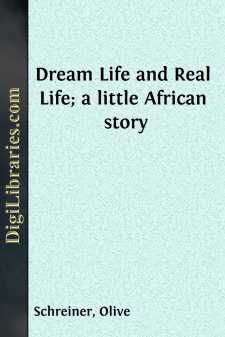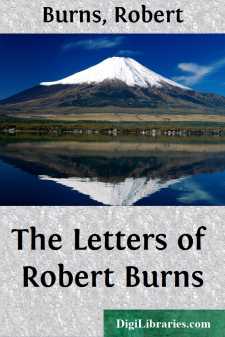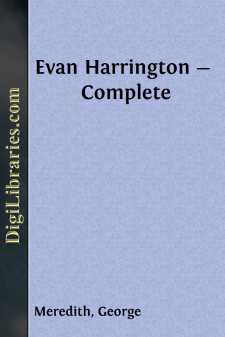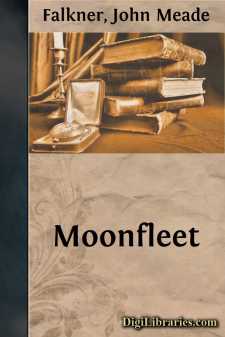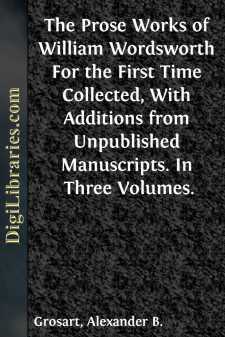Literary Collections
- American 84
- Ancient, Classical & Medieval 14
- Asian 1
- Australian & Oceanian 1
- Canadian 55
- Continental European 121
- English, Irish, Scottish, Welsh 179
- Essays 160
- General 24
- Letters 46
- Middle Eastern 1
Literary Collections Books
Sort by:
NOTES UPON GEORGE BORROW. I. Borrow as a Splendid Literary Amateur. There are some writers who cannot be adequately criticised—who cannot, indeed, be adequately written about at all—save by those to whom they are personally known. I allude to those writers of genius who, having only partially mastered the art of importing their own individual characteristics into literary forms, end their...
more...
by:
Olive Schreiner
I. DREAM LIFE AND REAL LIFE; A LITTLE AFRICAN STORY. Little Jannita sat alone beside a milk-bush. Before her and behind her stretched the plain, covered with red sand and thorny karoo bushes; and here and there a milk-bush, looking like a bundle of pale green rods tied together. Not a tree was to be seen anywhere, except on the banks of the river, and that was far away, and the sun beat on her head....
more...
by:
Robert Burns
BURNS'S LETTERS. It is not perhaps generally known that the prose of Burns exceeds in quantity his verse. The world remembers him as a poet, and forgets or overlooks his letters. His place among the poets has never been denied—it is in the first rank; nor is he lowest, though little remembered, among letter-writers. His letters gave Jeffrey a higher opinion of him as a man than did his poetry,...
more...
by:
George Meredith
CHAPTER I. ABOVE BUTTONS Long after the hours when tradesmen are in the habit of commencing business, the shutters of a certain shop in the town of Lymport-on-the-Sea remained significantly closed, and it became known that death had taken Mr. Melchisedec Harrington, and struck one off the list of living tailors. The demise of a respectable member of this class does not ordinarily create a profound...
more...
SECTION I (Aranyaka Parva) Om! Having bowed down to Narayana, and Nara the foremost of male beings, and the goddess Saraswati also, must the word Jaya be uttered. Janamejaya said, "O thou foremost of regenerate ones, deceitfully defeated at dice by the sons of Dhritarashtra and their counsellors, incensed by those wicked ones that thus brought about a fierce animosity, and addressed in language...
more...
SECTION I (Pandava-Pravesa Parva) OM! Having bowed down to Narayana, and Nara, the most exalted of male beings, and also to the goddess Saraswati, must the word Jaya be uttered. Janamejaya said, "How did my great-grandfathers, afflicted with the fear of Duryodhana, pass their days undiscovered in the city of Virata? And, O Brahman, how did the highly blessed Draupadi, stricken with woe, devoted to...
more...
CHAPTER 1 IN MOONFLEET VILLAGE So sleeps the pride of former days—More The village of Moonfleet lies half a mile from the sea on the right or west bank of the Fleet stream. This rivulet, which is so narrow as it passes the houses that I have known a good jumper clear it without a pole, broadens out into salt marshes below the village, and loses itself at last in a lake of brackish water. The lake is...
more...
SECTION I Om! Having bowed down to Narayana and Nara, the most exalted male being, and also to the goddess Saraswati, must the word Jaya be uttered. Ugrasrava, the son of Lomaharshana, surnamed Sauti, well-versed in the Puranas, bending with humility, one day approached the great sages of rigid vows, sitting at their ease, who had attended the twelve years' sacrifice of Saunaka, surnamed Kulapati,...
more...
by:
Ian Maclaren
A SUPRA-LAPSARIAN Jeremiah Saunderson had remained in the low estate of a "probationer" for twelve years after he left the Divinity Hall, where he was reported so great a scholar that the Professor of Apologetics spoke to him deprecatingly, and the Professor of Dogmatics openly consulted him on obscure writers. He had wooed twenty-three congregations in vain, from churches in the black country,...
more...
TO THE QUEEN. MADAM, I have the honour to place in your Majesty's hands the hitherto uncollected and unpublished Prose Works of WILLIAM WORDSWORTH —name sufficient in its simpleness to give lustre to any page. Having been requested thus to collect and edit his Prose Writings by those who hold his MSS. and are his nearest representatives, one little discovery or recovery among these MSS....
more...


